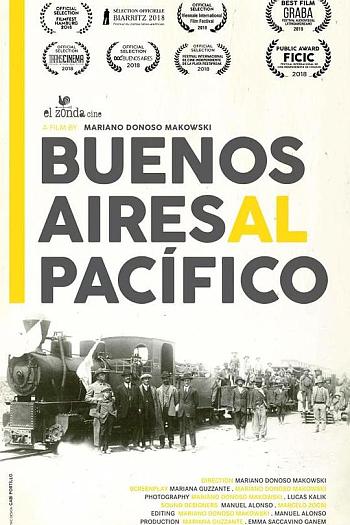
从布宜诺斯艾利斯到太平洋
| 导演: | Mariano Donoso |
| 编剧: | Mariano Donoso / Mariana Guzzante |
| 主演: | Julia Donoso Tomás Donoso Néstor Flores |
| 制片国家/地区: | 阿根廷 |
| 类型: | |
| 语言: | 西班牙语 |
| 年代: | 2018 |
| 上映: | 2018-03-14 |
| 片长: | 98分钟 |
| 豆瓣评分: | 0 |
| IMDB: | 0 |
| 影伴评分: | 0 |
剧情简介
Life is but a dream, said a Spanish playwright, and a Chinese poet also stated something similar. It could be said, too, that life can be a nightmare. Donoso’s fourth film is a personal dream populated by multitudes. In it, we find his deceased mother and her sons; the paradoxical President Perón and his people; the Lumières and their trains; the last engine driver in a railway... (展开全部)
Life is but a dream, said a Spanish playwright, and a Chinese poet also stated something similar. It could be said, too, that life can be a nightmare. Donoso’s fourth film is a personal dream populated by multitudes. In it, we find his deceased mother and her sons; the paradoxical President Perón and his people; the Lumières and their trains; the last engine driver in a railway company before the first Neoliberal movement in Argentina took this company apart; Marcel Proust as an actionist; Juan José Saer as a reference; Baruch Spinoza as a philosophical intuition. This is the dream of “The Century of Intentions,” or how a general system of movement could be doubled by images and sound in order to define the life of labor and spirit in the 20th century. Donoso’s dreams are staged in the ruins of a now-ghostly Argentina; and the same happens with the materials he gathers to establish a dialectic between what he films and yesterday’s archives. The result, as a whole, is a film about trains, cinema, and the body, in all its potentiality for labor and exploitation. (Roger Koza)
Life is but a dream, said a Spanish playwright, and a Chinese poet also stated something similar. It could be said, too, that life can be a nightmare. Donoso’s fourth film is a personal dream populated by multitudes. In it, we find his deceased mother and her sons; the paradoxical President Perón and his people; the Lumières and their trains; the last engine driver in a railway... (展开全部)
Life is but a dream, said a Spanish playwright, and a Chinese poet also stated something similar. It could be said, too, that life can be a nightmare. Donoso’s fourth film is a personal dream populated by multitudes. In it, we find his deceased mother and her sons; the paradoxical President Perón and his people; the Lumières and their trains; the last engine driver in a railway company before the first Neoliberal movement in Argentina took this company apart; Marcel Proust as an actionist; Juan José Saer as a reference; Baruch Spinoza as a philosophical intuition. This is the dream of “The Century of Intentions,” or how a general system of movement could be doubled by images and sound in order to define the life of labor and spirit in the 20th century. Donoso’s dreams are staged in the ruins of a now-ghostly Argentina; and the same happens with the materials he gathers to establish a dialectic between what he films and yesterday’s archives. The result, as a whole, is a film about trains, cinema, and the body, in all its potentiality for labor and exploitation. (Roger Koza)




